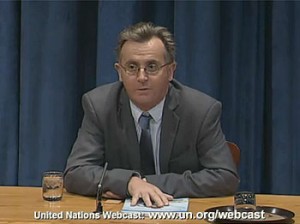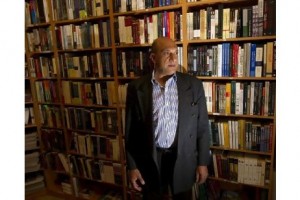The situation in Israel and the cccupied Palestinian territory covers a broad set of topics and issues which are continually interacting with each other and creating new situations on the ground. Keeping in mind that covering every aspect of the conflict on a day-by-day basis is beyond the abilities of this campaign, this section contains current analysis and reports from the ground to help give a more complete picture of the current situation. As we strive to present the many views expressed about the situation we must note that the views expressed here are not necessarily representative of the ELCA’s positions.
OCHA site | Latest OCHA Maps
 Despite some improvement in the Palestinian economy in the West Bank in 2009, this report by the International Labour Organization states that workers’ rights and human dignity are severely violated, and the right of the Palestinian people to decent work remains largely unfulfilled. The enduring human rights crisis in Gaza, the discrimination and the displacement of workers and their families in East Jerusalem, and the separation of families envisaged by the recent military order on infiltrators, all constitute further threats to peace and security. The report says East Jerusalem is becoming more isolated from the rest of the West Bank owing to a policy of reducing the proportion of Palestinians living and working there and calls the siege of Gaza unacceptable, unsustainable and counterproductive.”
Despite some improvement in the Palestinian economy in the West Bank in 2009, this report by the International Labour Organization states that workers’ rights and human dignity are severely violated, and the right of the Palestinian people to decent work remains largely unfulfilled. The enduring human rights crisis in Gaza, the discrimination and the displacement of workers and their families in East Jerusalem, and the separation of families envisaged by the recent military order on infiltrators, all constitute further threats to peace and security. The report says East Jerusalem is becoming more isolated from the rest of the West Bank owing to a policy of reducing the proportion of Palestinians living and working there and calls the siege of Gaza unacceptable, unsustainable and counterproductive.”
A report one year after Operation Cast Lead
According to a group of non-governmental organizations working in the region, “The international community has betrayed the people of Gaza by failing to back their words with effective action to secure the ending of the Israeli blockade which is preventing reconstruction and recovery.” Report with recommendations
This OCHA Special Focus covers the planning and zoning regime applied by the Israeli authorities in Area C of the West Bank, where Palestinian construction is effectively prohibited in some 70 percent of Area C. In the remaining 30 percent, a range of restrictions virtually eliminate the possibility of obtaining a building permit. As a result, Palestinians are left with no choice but to build “illegally” and risk demolition of their structures and displacement. The consequences of these actions are wide-ranging and extend to the entire Palestinian population of the West Bank.
The focus of this internal briefing paper is the Gaza Strip labour force and labour market in the 2008 relative to 2007. The aim is to provide a general quantitative framework on labour market conditions, as well as relevant and timely information and analysis for purposes of planning and programming.
The focus of this internal briefing paper is the West Bank labour force and labour market in 2008 relative to 2007. The aim is to provide a general quantitative framework on labour market conditions, as well as relevant and timely information and analysis for purposes of planning and programming.
This is UNRWA’s fifth report on economic and social developments in the occupied Palestinian territory. The present report is an update and covers changes in 2008. The report is divided into two substantive sections. The first addresses developments in domestic output and income through an assessment of national accounts data. Levels and changes in the Gross Domestic Product of the Palestinian public and private sectors are the focus of this section. The second section covers the oPt labour force and labour market dynamics. Data and analysis in the labour market section are disaggregated on the basis of refugee status.
Following the Hamas takeover of the Gaza Strip in June 2007, Israel has imposed an unprecedented blockade on all border crossings in and out of the Gaza Strip.1 The blockade has ‘locked in’ 1.5 million people in what is one of the most densely populated areas on earth, triggering a protracted human dignity crisis with negative humanitarian consequences. At the heart of this crisis is the degradation in the living conditions of the population, caused by the erosion of livelihoods and the gradual decline in the state of infrastructure, and the quality of vital services in the areas of health, water and sanitation, and education.
A fact sheet on childern, education and blockade.
Detailed maps of West Bank, Gaza Strip and Jerusalem governorates, featuring all the checkpoints and obstacles to Palestinian movement including the West Bank Barrier, Israeli settlements, restricted roads and closed areas.
This OCHA Special Focus reports on the Bethlehem governorate documents how the central-urban core is constricted by a combination of Israeli infrastructure, including the Barrier, settlements and settlement outposts. Only 13% of Bethlehem land is available for Palestinian use out of 660 sq. kilometers and much of it is fragmented.
This OCHA Special Focus addresses the phenomenon of “illegal” Palestinian construction in East Jerusalem, the failure of the Israeli authorities to provide adequate planning for Palestinian neighborhoods and gives an overview of at-risk communities and various community initiatives to overcome obstacles in the current municipal planning process.
Palestinian Christians are under many pressures that put the community at risk. This small booklet is the most comprehensive source available for up-to-date information on the community. Diyar is a consortium of Lutheran-based, ecumenically-oriented institutions serving the whole Palestinian community. (Edited by Rania Al Qass Collings, Rifat Odeh Kassis, and Mitri Raheb.)
This report was released by the United Nations Relief and Works Agency (UNRWA) as a briefing paper designed to aid UNRWA in understanding the economic impacts of the tumultuous conditions of 2007. The paper includes information on trends, poverty by region, and the effectiveness of external assistance.
The views expressed in these materials represent the positions of outside organizations and may not necessarily reflect an official position of the ELCA.



 Despite some improvement in the Palestinian economy in the West Bank in 2009, this report by the International Labour Organization states that workers’ rights and human dignity are severely violated, and the right of the Palestinian people to decent work remains largely unfulfilled. The enduring human rights crisis in Gaza, the discrimination and the displacement of workers and their families in East Jerusalem, and the separation of families envisaged by the recent military order on infiltrators, all constitute further threats to peace and security. The report says East Jerusalem is becoming more isolated from the rest of the West Bank owing to a policy of reducing the proportion of Palestinians living and working there and calls the siege of Gaza unacceptable, unsustainable and counterproductive.”
Despite some improvement in the Palestinian economy in the West Bank in 2009, this report by the International Labour Organization states that workers’ rights and human dignity are severely violated, and the right of the Palestinian people to decent work remains largely unfulfilled. The enduring human rights crisis in Gaza, the discrimination and the displacement of workers and their families in East Jerusalem, and the separation of families envisaged by the recent military order on infiltrators, all constitute further threats to peace and security. The report says East Jerusalem is becoming more isolated from the rest of the West Bank owing to a policy of reducing the proportion of Palestinians living and working there and calls the siege of Gaza unacceptable, unsustainable and counterproductive.”